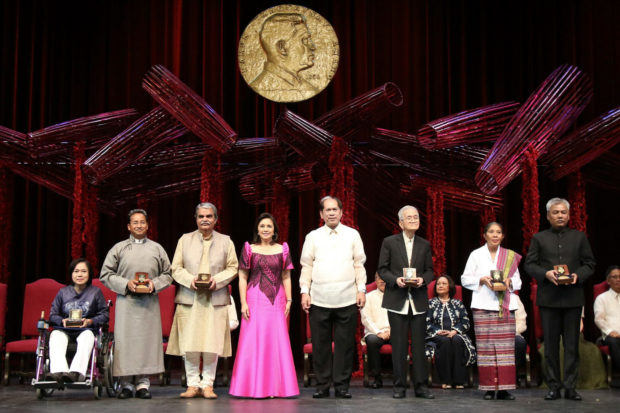
FOR SELFLESS SERVICE The 2018 Ramon Magsaysay awardees hold their citation in ceremonies held at the Cultural Center of the Philippines on Friday. From left: Vo Thi Hoang Yen (Vietnam), Sonam Wangchuk (India), Bharat Vatwani (India), keynote speaker Vice President Leni Robredo, Ramon Magsaysay Awards Foundation chair Senen Bacani, Howard Dee (Philippines), Maria de Lourdes Martins Cruz (East Timor) and Youk Chhang (Cambodia). Established in 1957 and regarded as Asia’s equivalent of the Nobel Prize, the award celebrates the memory of President Ramon Magsaysay and honors individuals or organizations for their selfless service. —RICHARD A. REYES
Who do you blame when students fail in school? The children or the educational system?
Three decades ago at Ladakh in northern India, up to 95 percent of students in the desert region failed each year in the government exams, which would have qualified them to proceed to Grade 11. But rather than take a look at how the lessons were taught, people were quick to blame the students for their poor performance.
As someone who grew up in one of the region’s remote villages, Sonam Wangchuk knew he had to do something not only to help the students but also to improve his locale’s educational system.
After all, he believes that “any system that produces such failure is at fault.”
In 1988, Wangchuk attacked the heart of the problem by establishing the alternative learning institution Students’ Educational and Cultural Movement of Ladakh (Secmol), which catered to students who had failed in the government exams.
Did Wangchuk sit the students down for a strict and intensive review of their lessons? Quite the contrary.
“I was made to feel like a mentally challenged person because I came from the mountains and didn’t speak the language used in school” —Sonam Wangchuk Educator. EDWIN BACASMAS
Creative, child-friendly
He subjected them to a “creative, child-friendly and activity-based” curriculum that reconnected them to their culture and identity as a Ladakhi. He wanted them to experience an education that “made sense” to their situation as mountain dwellers—one that he himself was deprived of.
Wangchuk recalled that his “true learning” stopped when he first went to school at the age of 9. Apart from the “harsh treatment,” he said that the medium of instruction was one he did not quite understand.
“I was made to feel like a mentally challenged person because I came from the mountains and didn’t speak the language used in school. Our life experiences were also so different from what they teach in textbooks. Minorities were made to feel that there was something wrong with them,” Wangchuk recalled.
While most people in Ladakh speak Ladakhi, Urdu is the language used in school. And since the textbooks used are sourced from the capital, New Delhi, the settings and city life examples in them did not make sense to the students who have lived in the mountains all their life.
Critical thinking
Wangchuk and his group of volunteer teachers at Secmol decided to change the situation by drawing up textbooks that are “more relevant to the lives of the children.”
They also made students take more responsibility by encouraging critical thinking and peer learning, and delegating to them tasks that help in the school’s operations—from tending the gardens to milking the cows and welcoming visitors. The students are even tasked to look after the school’s solar power installations that Wangchuk had developed.
Success replicated
Such changes, Wangchuk said, helped improve the students’ performance in the exams. From a dismal 5 percent when they started in 1988, the students’ passing rate in the exams eventually soared to 75 percent in 2015. The alternative learning model was also replicated in at least 33 schools in the region.
The accomplishment has not gone unnoticed, with Wangchuk receiving at least 11 awards over the years for his initiative.
The latest accolade is the prestigious Ramon Magsaysay Award that recognizes Wangchuk’s “uniquely systematic, collaborative and community-driven reform of learning systems in remote northern India, thus improving the life opportunities of Ladakhi youth, and his constructive engagement of all sectors in local society to harness science and culture creatively for economic progress, thus setting an example for minority peoples in the world.”
‘Culturally irrelevant’
Wangchuk and five other awardees were feted in ceremonies held on Friday afternoon at the Cultural Center of the Philippines, with Vice President Leni Robredo as keynote speaker.
While Wangchuk may have helped start a movement that transformed Ladakh’s “culturally irrelevant, environmentally inappropriate” education system to one that is more “child-friendly,” he himself admitted that the result was “still far from what the children deserve.”
Factory schooling
For one, Wangchuk said, he hoped that the system they had developed would not remain as a mere alternative to students.
“For now, making children engage in what they love and learn from it appears to be an alternative because the mainstream [kind of education] is just like factory schooling. Hopefully, this would change,” he said.
Asked why the government seems to be holding back in embracing their education model, Wangchuk said the problem lay with the people themselves.
“Governments don’t do things that the people don’t demand. In democracies, governments want to be seen to be doing things needed by the people. When the people aspire for change, governments will want to bring [about] that [change]. Otherwise why go through all the pain and trouble of bringing change when the people don’t even aspire for it,” he said.
Though he is an engineer by profession, Wangchuk feels strongly about providing and promoting better education, especially among children who have less in life. The gap between the rich and the poor can only be bridged by education, he said.
“If the basic education is not right for the poor or much better for the rich, the gap will remain. Education is an equalizer, so it is very important that everybody gets a fair chance,” he added.